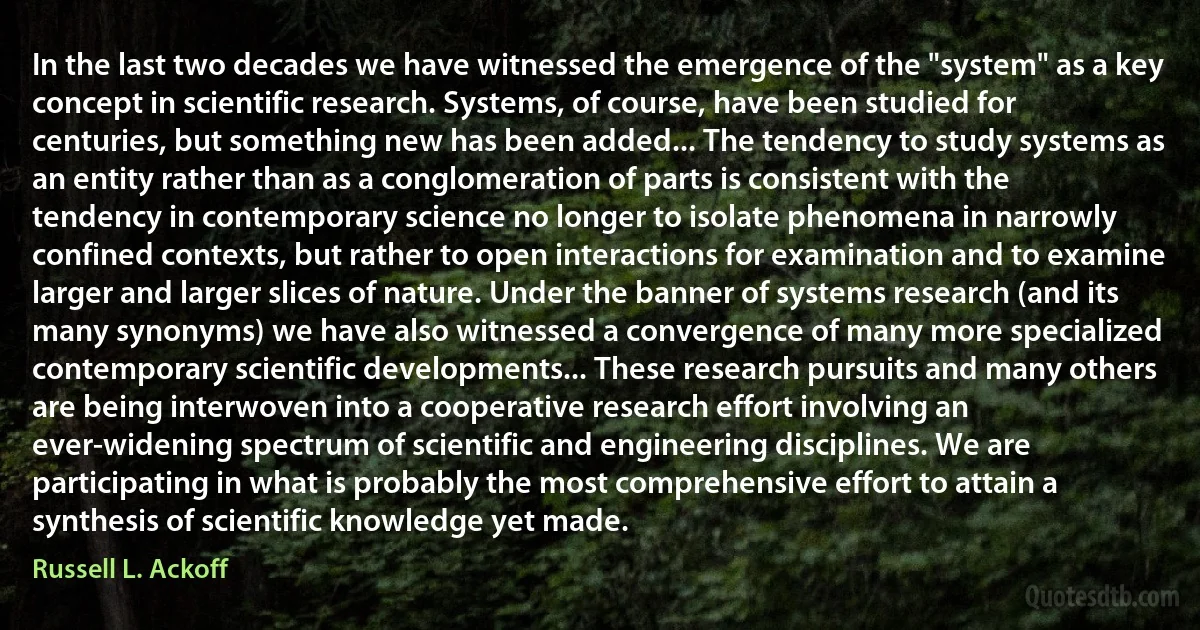
In the last two decades we have witnessed the emergence of the "system" as a key concept in scientific research. Systems, of course, have been studied for centuries, but something new has been added... The tendency to study systems as an entity rather than as a conglomeration of parts is consistent with the tendency in contemporary science no longer to isolate phenomena in narrowly confined contexts, but rather to open interactions for examination and to examine larger and larger slices of nature. Under the banner of systems research (and its many synonyms) we have also witnessed a convergence of many more specialized contemporary scientific developments... These research pursuits and many others are being interwoven into a cooperative research effort involving an ever-widening spectrum of scientific and engineering disciplines. We are participating in what is probably the most comprehensive effort to attain a synthesis of scientific knowledge yet made.
Russell L. AckoffRelated topics
comprehensive concept conglomeration contemporary convergence cooperative course effort emergence engineering entity isolate key knowledge last longer nature open research science something spectrum study synthesis tendency under yet others partsRelated quotes
The "Second System Effect":
An architect's first work is apt to be spare and clean. He knows he doesn't know what he's doing, so he does it carefully and with great restraint.
As he designs the first work, frill after frill and embellishment after embellishment occur to him. These get stored away to be used "next time.” Sooner or later the first system is finished, and the architect, with firm confidence and a demonstrated mastery of that class of systems, is ready to build a second system.
This second is the most dangerous system a man ever designs. When he does his third and later ones, his prior experiences will confirm each other as to the general characteristics of such systems, and their differences will identify those parts of his experience that are particular and not generalizable.
The general tendency is to over-design the second system, using all the ideas and frills that were cautiously sidetracked on the first one. The result, as Ovid says, is a "big pile."

Fred Brooks
It has been argued that the perfection of guns of great destructive power will stop warfare. So I myself thought for a long time, but now I believe this to be a profound mistake. Such developments will greatly modify, but not arrest it. On the contrary, I think that every new arm that is invented, every new departure that is made in this direction, merely invites new talent and skill, engages new effort, offers new incentive, and so only gives a fresh impetus to further development. Think of the discovery of gun-powder. Can we conceive of any more radical departure than was effected by this innovation? Let us imagine ourselves living in that period: would we not have thought then that warfare was at an end, when the armor of the knight became an object of ridicule, when bodily strength and skill, meaning so much before, became of comparatively little value? Yet gunpowder did not stop warfare: quite the opposite it acted as a most powerful incentive.

Nikola Tesla
Computer games are embedded in the cultural framework of technological developments. In the study of technological development and creativity, focusing attention on the failure, the error, the breakdown, the malfunction means opening the black box of technology. Studies have convincingly demonstrated that the widespread inability to understand technological artifacts as fabricated entities, as social and cultural phenomena, derives from the fact that in retrospect only those technologies that prove functional for a culture and can be integrated into everyday life are "left over." However, the perception of what is functional, successful and useful is itself the product of social and cultural--and last but not least--political and economic processes. Selection processes and abandoned products and product forms are usually not discussed. According to Langdon Winner, there is a sense in which all technical activity contains an inherent tendency toward forgetfulness.

Johannes Grenzfurthner
Contemporary theories of politics tend to portray politics as a reflection of society, political phenomena as the aggregate consequences of individual behavior, action as the result of choices based on calculated self-interest, history as efficient in reaching unique and appropriate outcomes, and decision making and the allocation of resources as the central foci of political life. Some recent theoretical thought in political science, however, blends elements of these theoretical styles into an older concern with institutions. This new institutionalism emphasizes the relative autonomy of political institutions, possibilities for inefficiency in history, and the importance of symbolic action to an understanding of politics. Such ideas have a reasonable empirical basis, but they are not characterized by powerful theoretical forms. Some directions for theoretical research may, however, be identified in institutionalist conceptions of political order.

James G. March
The proof of the pudding is in the eating. There was a widespread myth of the 1970s, a myth along Tom Kuhn's (1962) Structure of Scientific Revolutions lines. The Keynesianism, which worked so well in Camelot and brought forth a long epoch of price-level stability with good Q growth and nearly full employment, gave way to a new and quite different macro view after 1966. A new paradigm, monistic monetarism, so the tale narrates, gave a better fit. And therefore King Keynes lost self esteem and public esteem. The King is dead. Long live King Milton!
Contemplate the true facts. Examine 10 prominent best forecasting models 1950 to 1980: Wharton, Townsend–Greenspan, Michigan Model, St. Louis Reserve Bank, Citibank Economic Department under Walter Wriston's choice of Lief Olson, et cetera. ... M did matter as for almost everyone. But never did M alone matter systemically, as post-1950 Friedman monetarism professed.

Paul Samuelson
